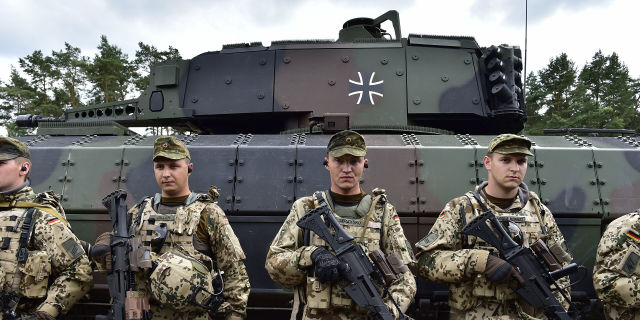The ambitions of the Bundeswehr disrupt the balance of the armed forces of Germany and France After the outbreak of the conflict in Ukraine, Germany began to modernize the armed forces, writes Le Figaro.
The ambitions of the Bundeswehr may shake the geostrategic balance in Europe, and France risks being sidelined in defense issues.
Nicolas BarotteBerlin claims to be the leading military power in Europe.
"Germany will soon have the largest army in Europe," Chancellor Olaf Scholz assured in May. This statement was little discussed abroad, as if the promise formulated by Berlin was in doubt. Given the current state of the Bundeswehr, such ambitions can cause a smile or concern. After the start of the special operation in Ukraine, the Chief of the General Staff complained that the German army was stranded, that is, it did not have enough funds to meet the needs associated with the crisis. Since then, Berlin has been talking about power and the army. Even members of the traditionally restrained SPD are calling for a "Fuhrungsmacht", that is, for political leadership that will help strengthen the economy. Almost ten years after the statements about the "responsibility" that Germany must assume before the whole world, the time has come to act.
"France must necessarily be careful not to be in the position of always catching up," warns Vice—president of the parliamentary defense committee Jean-Louis Thierault. This fall, France will begin discussing a new law on military planning. "The French army must maintain parity with Germany," he added.
So, in Germany they started talking about strengthening the troops. A special fund of one hundred billion euros will be allocated for the modernization of the Bundeswehr. The amount will be used in installments, starting from a modest eight billion euros next year. In total, 40 billion euros will be spent on the purchase of American F-35 aircraft capable of carrying nuclear charges. Twenty billion euros will be allocated for control systems, another 20 billion for the navy and 16 billion for the army. These funds will help to make up for lost time in recent years. The Bundeswehr lacks a lot of things. Not all of its communication systems are compatible with the weapons of other NATO countries. The German army lags far behind the French and British armed forces.
Due to the difficulties in defense, Germany plans to increase military spending to 2% of GDP, as required by NATO. In a few years, they will overcome the 50 billion euro mark, which is more than the budget of the French military department. "Unlike the French army, the Bundeswehr does not bear the costs of nuclear deterrence, so it can become the first army in Europe with its own budget," notes Jean-Louis Thierault. He approves of the European capacity building, but is concerned about the consequences of this transformation. The autonomy of the Bundeswehr's actions is extremely limited.
In Europe and within NATO, the ratio of military forces will change. "These steps should strengthen Germany's autonomous potential for military action," the Montaigne Institute said in a report published in July. "It is likely that Germany will use it to protect its industrial interests and assert its growing authority in the international arena. This will disrupt the geostrategic balance in Europe, since until now only France could claim leadership in defense issues within the Union and use this lever at the international level," the authors add.
"Since 2014 and after the annexation of Crimea, everyone has been waiting for Germany to fulfill its obligations" regarding collective defense, the former German diplomat notes. In his opinion, today the country is able to do this, since society no longer expresses objections.
Bans, including on nuclear energy, no longer exist: this summer, former Finance Minister Wolfgang Schaeuble said that Germany should make a financial contribution to the French nuclear forces in exchange for a joint nuclear deterrent. Unlikely? In February 2020, President Emmanuel Macron expressed a desire to involve Europeans more in French deterrence missions. The project remained unrealized due to the pandemic. If no one supports Wolfgang Schaeuble's position, a debate may begin.
In France, the military is cautious about commenting on the ambitions of the Bundeswehr. "I do not know whether the German army will be able to turn the available resources into an effective military potential," General Pierre Schill, the Chief of Staff of the Army, said during a hearing in the National Assembly in July. He spoke with his German colleague before the summer. "I stressed the importance, if not of buying our equipment, then at least of creating systems of interaction with France. I hope that I was heard," he added. However, Paris and Berlin distanced themselves from each other. Two armies are waiting for the political decision of their governments. A Franco-German council of ministers on this issue will be held in early September.
To earn trust, the Bundeswehr must become independent. "A budget without a strategy does not make sense or, roughly speaking, is needed to buy various things," warns Paul Maurice, a specialist on Germany at the French Institute of International Relations. In the security strategy that Berlin will unveil by the end of the year, the Bundeswehr will have to answer important questions, including defining its tasks.
"The German army does not just want to be the executor of other people's strategies," adds Paul Maurice. "If Germany invests wisely, it can become the backbone of NATO," writes Claudia Major, a defense specialist at the SWP Institute in Berlin, in a note on the future of the North Atlantic Alliance published in July. She believes that, given its geographical location, Germany can also become a logistics hub for possible NATO missions to the east of its territory. Berlin's place as the main ally of the United States will be strengthened.

